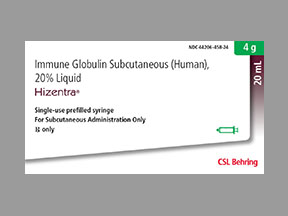
Hizentra Coupons & Savings Card – Discount Prices from $1032.19
My prescription
Edit
20ML of 4GM/20ML, Hizentra (1 Syringe)
Select pharmacy

Albertsons
$1032.19
COUPON PRICE
Walgreens
$1036.61
COUPON PRICE
Walmart
$1038.15
COUPON PRICEHizentra savings card
Show this card to your pharmacist
Albertsons
$1032.19
BIN
ID
PCN
GRP
019876
LH15AA795F
CHIPPO
LHX
Powered by
Related human immunoglobulin gs prescriptions
More prescriptions for immunodeficiency
Related human immunoglobulin gs prescriptions
More prescriptions for immunodeficiency
Price history for Hizentra
1 Syringe, 20ML of 4GM/20ML
Average retail price for Hizentra
Average SaveHealth price for Hizentra
Our price history data is based on aggregated prescription data collected from participating pharmacies in America. Our prescription data updates daily to reflect the latest price changes. If you notice a missing data point, it means there wasn't sufficient data available to generate a monetary value for that date.
*Retail prices are based on pharmacy claims data, and may not be accurate when we don't have enough claims.
Hizentra dosage forms
Dosage Quantity Price from Per unit 5ML 1 Syringe $263.68 $263.68 5ML 2 Syringes $519.85 $259.93 5ML 3 Syringes $776.03 $258.68 10ML of 2GM/10ML 1 Syringe $519.85 $519.85 10ML of 2GM/10ML 2 Syringes $1032.19 $516.10 10ML of 2GM/10ML 3 Syringes $1544.54 $514.85 20ML of 4GM/20ML 1 Syringe $1032.19 $1032.19 20ML of 4GM/20ML 2 Syringes $2056.88 $1028.44 20ML of 4GM/20ML 3 Syringes $3081.57 $1027.19 50ML of 10GM/50ML 1 Syringe $2569.23 $2569.23
| Dosage | Quantity | Price from | Per unit |
|---|---|---|---|
| 5ML | 1 Syringe | $263.68 | $263.68 |
| 5ML | 2 Syringes | $519.85 | $259.93 |
| 5ML | 3 Syringes | $776.03 | $258.68 |
| 10ML of 2GM/10ML | 1 Syringe | $519.85 | $519.85 |
| 10ML of 2GM/10ML | 2 Syringes | $1032.19 | $516.10 |
| 10ML of 2GM/10ML | 3 Syringes | $1544.54 | $514.85 |
| 20ML of 4GM/20ML | 1 Syringe | $1032.19 | $1032.19 |
| 20ML of 4GM/20ML | 2 Syringes | $2056.88 | $1028.44 |
| 20ML of 4GM/20ML | 3 Syringes | $3081.57 | $1027.19 |
| 50ML of 10GM/50ML | 1 Syringe | $2569.23 | $2569.23 |
| 50ML of 10GM/50ML | 2 Syringes | $5130.97 | $2565.49 |
| 50ML of 10GM/50ML | 3 Syringes | $7692.70 | $2564.23 |
What is Hizentra used for?
Hizentra is used for the treatment of primary immunodeficiency (PI) in adults and children. It helps to provide the necessary antibodies that individuals with PI lack, thereby reducing the risk of infections.
How expensive is Hizentra?
The cost of Hizentra can vary significantly based on factors such as dosage, location, insurance coverage, and the pharmacy or healthcare provider. Without insurance, the price can be quite high, often several thousand dollars for a month's supply. Patients are encouraged to check with their insurance provider for coverage details and potential out-of-pocket costs. Additionally, there may be patient assistance programs available to help reduce the cost for eligible individuals.
Are Hizentra vials being discontinued?
As of the latest available information, Hizentra vials have not been discontinued. It is always advisable to check with a healthcare provider or pharmacist for the most current information regarding medication availability.
What is the shelf life of Hizentra?
The shelf life of Hizentra is typically 36 months when stored at temperatures not exceeding 25C (77F). It should be protected from light and not frozen. Always refer to the product packaging or consult a healthcare professional for the most accurate information.
Can Hizentra cause kidney failure?
Hizentra, an immune globulin subcutaneous (human) product, is not commonly associated with causing kidney failure. However, immune globulin products in general have been linked to kidney problems, particularly in patients with pre-existing kidney issues or those who are dehydrated. It is important for patients to stay well-hydrated and for healthcare providers to monitor kidney function during treatment. If there are concerns about kidney health, it is advisable to discuss them with a healthcare professional.
